What Do I Need to Know About Electric Cars
Electric car sales in the UK have risen dramatically in recent years, but for many drivers the question remains: is an electric car right for me?
With help from the Energy Saving Trust, we've put together this buyer's guide to help you decide whether to go electric.
Types of electric and plug-in vehicles
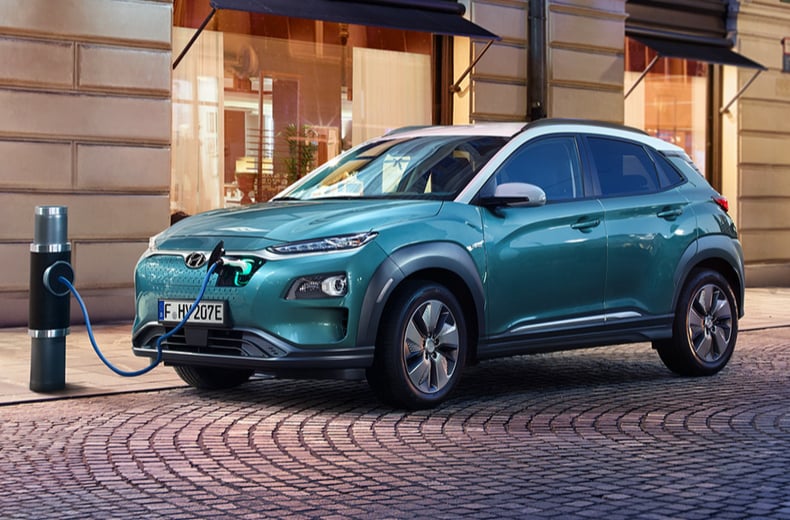
If you're considering an electric vehicle for the first time, you might be confused by the terminology and array of acronyms you're faced with. A summary of the commercially available electric car types is as follows:
- Electric vehicle (EV)
- Battery electric vehicle (BEV)
- Plug-in hybrid (PHEV)
- Hybrid (HEV)
- Mild electric vehicle (MHEV)
- Range-extended electric vehicle (RE-EV)
- Hydrogen vehicle (FCEV)
For more info about these vehicles, read our guide to the different types of electric vehicles.
What EVs are available?
These are exciting times for EVs with the number of vehicles available increasing rapidly and new models launched almost weekly.
Models currently available in the UK include the Nissan Leaf, Renault Zoe, BMW i3, Kia e-Niro and Soul, Hyundai Ionic and Kona, VW e-Golf, Jaguar I-PACE and Tesla Model S, Model X and Model 3.
Here's an up to date look at all the latest electric, hybrid and plug-in car reviews. We review used EVs, hybrids and PHEVs too.
How many electric vehicles are there in the UK?
Our 'Road to Electric' page breaks down the number of electric vehicles on our roads, by the different types.
Electric car buyers guide
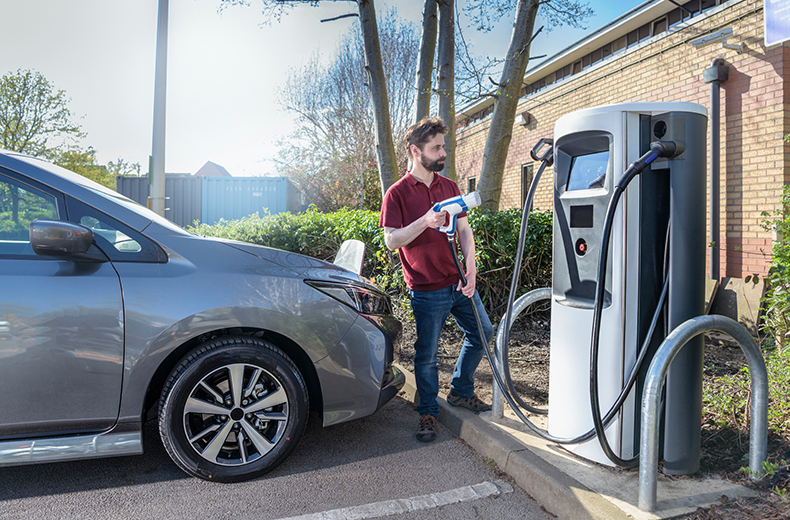
Where can I buy an EV?
New EVs can be bought from vehicle dealerships or leased through leasing companies in the same way as conventional vehicles.
Tesla are an exception in that they do not have a traditional dealer network and most of their sales are online.
Used EVs can also be bought through traditional vehicle sales outlets including franchised and independent dealers.
If you're buying a used EV, look for a retailer certified for its EV knowledge and excellence through the Electric Vehicle Approved (EVA) scheme.
This scheme is operated by the National Franchised Dealers Association and is approved by the Energy Saving Trust, which audits the retailers, and by the Government's Office for Low Emission Vehicles.
Upfront cost
Some people buy electric cars because they're fascinated by the tech (we're looking at you, Tesla owners), whilst others base their decision on an ethical desire to go green.
For most of us, though, an electric car needs to make financial sense, which means considering costs.
How much does an electric car cost?
EVs generally have higher purchase costs than their petrol and diesel competitors, but lower running costs as fuel, tax and maintenance costs are all generally significantly cheaper.
The lowest cost new EVs currently available in the UK start at a little under £20,000 once the government funded purchase grant has been deducted, though for this price you'd also need to lease the batteries monthly.
The lowest price EVs with owned batteries start at around £25,000. Used EVs can be purchased in the UK from around £10,000.
As with conventional cars, buying second-hand is a much cheaper option, but then you'll have to consider a potentially deteriorated battery life and buying a new battery is nearly tantamount to a write off.
You're not exactly spoilt for choice, either, as there are far fewer pure electric second-hand cars for sale, than conventional petrol and diesel.
The Nissan Leaf is by far the most common used electric vehicle, although the Renault Zoe is a cheap second-hand buy.
But be warned, because the list prices are unlikely to include the cost of battery leasing, although some Leaf or Zoe owners may have bought the battery outright.
Electric car leasing is often a much more affordable option for those looking to make the switch. Find out why in our EV leasing guide.
Electric car prices
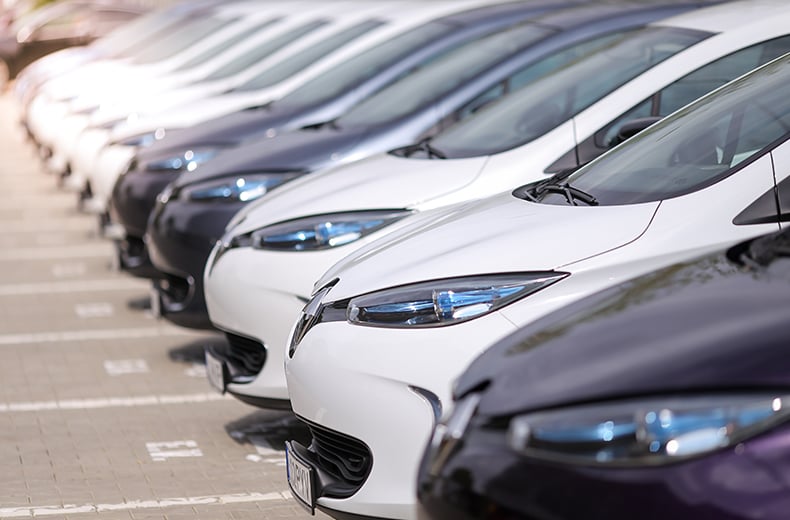
Just like their petrol and diesel equivalents, the price of electric cars varies widely, from less than £7,000 for a Renault Twizy to £120,000+ for a top-spec Tesla Model S.
Below we have outlined rough prices (correct at the point of writing) for new electric cars within three budget levels, just remember to check whether you're eligible for the government grant.
Top end EVs:
| Car | Approximate price |
|---|---|
| BMW i8 | £100,000 |
| Porsche Taycan | £85,000 |
| Tesla Model X | £82,000 |
| Tesla Model S | £80,000 |
| Audi E-Tron | £70,000 |
| Mercedes EQC | £66,000 |
| Jaguar I-Pace | £60,000 |
| Car | Approximate price |
|---|---|
| Tesla Model 3 | £40,000 |
| BMW i3 | £36,000 |
| Tesla Model Y | £35,000 (expected) |
| Tesla Cybertruck | £35,000 (expected) |
| Kia e-Niro | £34,000 |
| Volkswagen e-Golf | £34,000 |
| Hyundai Ioniq | £30,000 |
| Hyundai Kona | £29,000 |
| Peugeot e-208 | £29,000 |
NEW! Electric car leasing deals
The easy way to go electric. Get all the benefits of a brand new car, without the hassle of owning it. Find your brand new electric car today!
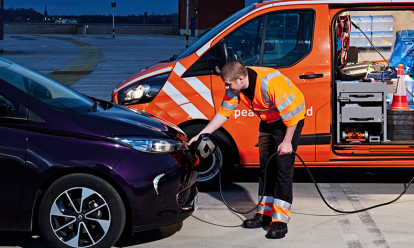

| Car | Approximate price |
|---|---|
| Nissan Leaf | £27,000 |
| Vauxhall Corsa-e | £27,000 |
| Volkswagen ID.3 | £27,000 |
| Honda e | £26,000 |
| Renault Zoe | £25,000 |
| Mini Electric | £24,000 |
| Volkswagen e-up | £20,000 |
| Smart EQ | £17,000 |
If you're buying used, choice can be limited – and you won't find electric for banger money.
Used Nissan Leafs – the UK's best-selling electric car – start from around £7,000, for example, while Renault Zoe prices start from £4,500.
Find used EVs in your area with our RAC Approved Dealer network.
Cheapest electric cars
If we ignore the two-seat Twizy (technically a quadricycle, rather than a car), there are a handful of pure electric cars on sale for around the same price.
You should consider the Renault Zoe, Smart EQ ForTwo and ForFour, VW e-up and Mini Electric.
Before buying any electric car, remember to factor in deductions from the government grant and the cost to hire the battery, if that's applicable to the model you're interested in.
We've got a full rundown of the best new and used EVs you can get for cheap right now. Read our cheapest electric cars guide next.
Electric car battery lease
Today most EVs have owned, not leased batteries. The Renault Zoe is an exception that is still sold new with the choice of an owned or leased battery, but most if not all other new EVs on sale in the UK now come with owned batteries.
Renault's lease costs vary from £49 to £110 per month2 depending on battery size and permitted mileage.
Until a few years ago leasing an EV's batteries was more common.
This was mainly to de-risk the process for EV purchasers since if a battery failed or suffered a major loss of performance it would be replaced under the lease agreement. Leasing EV batteries also helps keep purchase costs down.
If you buy a used EV you are more likely to come across leased batteries, for example some of the earlier Leafs as well as the Zoes have leased batteries. If you buy a used EV with leased batteries you would also need to sign a battery lease contract with the manufacturer.
Why do so many EVs have long waiting lists?
The demand for EVs has increased rapidly in recent times and many now have waiting lists.
It is widely reported that the global supply of lithium ion batteries is struggling to keep up with the increased demand.
However, this is generally seen as a short-term problem, perhaps reflecting an industry caught off-guard by the rapid increase in demand, and both battery production and the production of lithium and other precious metals is being ramped up rapidly across the globe.
In 2018 lithium, cobalt, graphite and nickel prices, all of which are used in EV production, all fell back significantly after price spikes in 2016 and 2017,3 indicating that supply of these metals is not the root cause.
Warranty
EVs typically have between five and eight years' warranty on the electric motor and battery components.
For the rest of the car, the length of warranty depends on the manufacturer – ranging from three years and 60,000 miles to seven years and 100,000 miles.
How much does it cost to run an electric car?
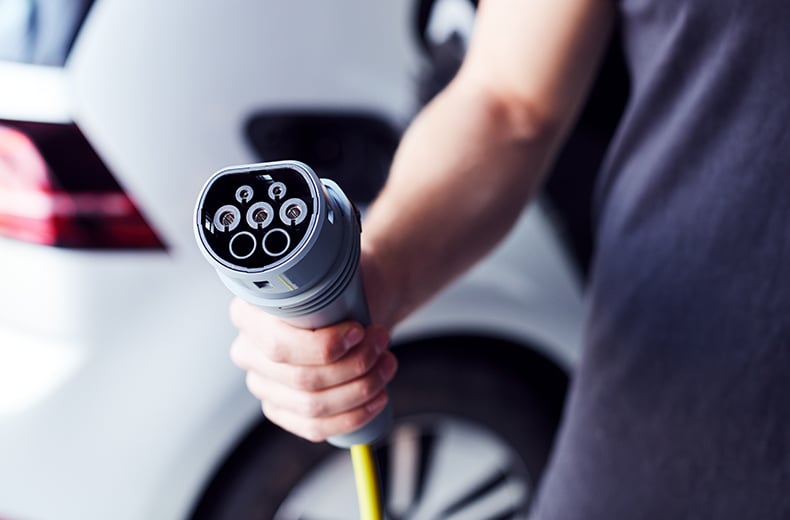
Fuel costs are much lower for EVs than for conventionally fuelled vehicles. The cost to charge an EV depends on the size of the battery and where you're charging it.
For example, charging a fairly typical 40kWh battery from zero to 100% at home on a typical domestic (household) tariff of 15p/kWh, would cost £6.60 (allowing 10% losses at the charger), whereas fully charging the same battery at a motorway service station might typically cost around twice that amount.
Many supermarkets, cinemas and some car parks even offer free charging.
Drivers that are able to charge at their workplace usually also receive free charging and there is no benefit in kind liability associated with this.
Check out our in-depth guide to how electric car charging works, how much it costs, and how long it takes.
Electric car service and repair
Compared with petrol and diesel vehicles, EV servicing and maintenance costs are considerably lower than their petrol and diesel equivalents.
This is down to electric motors containing much fewer moving parts than internal combustion engines. In addition, EVs don't have other familiar car parts like a gear box, clutch, exhaust, catalytic converter, starter motor and more.
Even the brake pads and discs on an EV receive much less wear and tear because much of an EV's braking is achieved through regenerative braking.
Nissan says servicing a Leaf costs just £11 a month and Tesla boasts that it can perform many servicing functions remotely via software updates.
If you rent the battery, Renault will guarantee performance of at least 75% of its original capacity or pay for repair/replacement.
If buying outright, the battery is covered for eight years or 100,000 miles, along with a performance guarantee to at least 66% of its original charge capacity.
Electric car MOTs
You don't escape the MOT test simply by choosing an EV. Like all cars, EVs have to pass an annual roadworthiness inspection after they are three years old.
The main difference is that there is no emissions test, so that's one less area to potentially fail on.
The maximum car MOT test fee is £54.85. However, there are many garages that will undercut this.
Find a reliable garage with our RAC Approved Garages search tool.
Electric car insurance
Insurance ratings – and thus costs – for electric cars tend to be slightly higher than for petrol or diesel equivalents.
These higher costs may be due to the more limited options when it comes to repairing them.
That said, you may be able to negotiate a limited-mileage policy to keep costs down.
If you lease a battery, it remains the property of the car manufacturer, so your insurance company should be informed.
For more detail on EV car insurance and whether it's cheaper, read our full guide.
EV Breakdown Cover
RAC do more than any other breakdown provider, to keep you and your EV on the road. Read more about our EV breakdown cover options here.

Get a free MOT
RAC Breakdown Cover comes with home rescue as standard. Plus, get a free MOT with Advanced and Ultimate.*

| Vehicle | Maximum grant |
|---|---|
| Electric car | £3,000 |
| Electric bike / moped | £1,500 |
| Small electric van | £3,000 |
| Large electric van | £6,000 |
| Taxis | £7,500 |
| Trucks | £16,000 |
| Plug-in hybrid | Not eligible |
The EV dealer applies for and receives the grant so if you're buying an EV you don't need to do anything.
But if you're considering the economics of purchasing an EV, remember that the prices quoted by dealers will almost always already have the value of the grant deducted.
How much does it cost to install an electric car charger at home?
The typical cost of a home charge point is around £800.
Under its Electric Vehicle Homecharge Scheme, OLEV currently offers a grant of up to 75% of this cost, capped at a maximum grant of £350.
Other electric car incentives
- Pay zero road tax (unless the car has a list price of more than £40,000)
- Very low (soon to be zero) company car tax
- The VAT on domestic electricity is only 5%
- EVs are eligible for a 100% discount from the London Congestion Charge and Ultra Low Emissions Zone (ULEZ)
- In many places EVs pay reduced or zero parking charges
- Planned 'green licence plate' initiatives which would allow them to use bus lanes
EV Charging
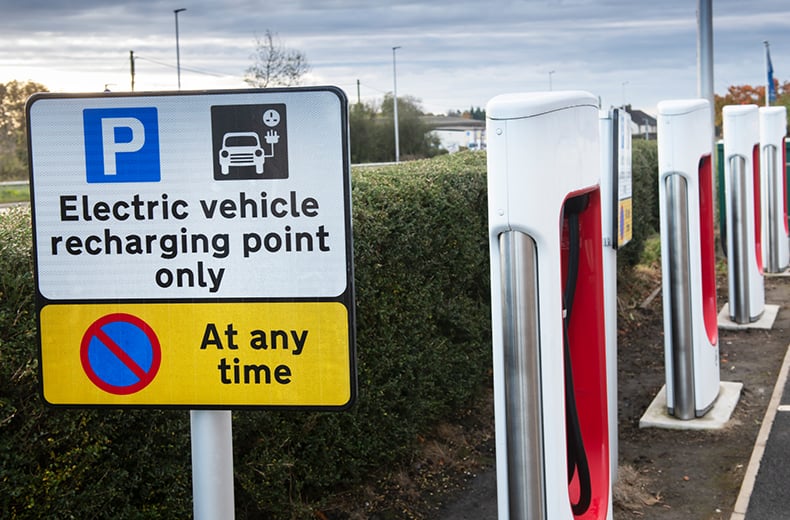
Charging your electric car can be done at home, at work or at a public charging point.
However, the world of EV charging can be complicated. There are different rates, charging speeds, voltages, battery sizes, ranges, connectors... the list goes on.
To answer all your questions and more about EV charging, check out our in-depth guide to how electric car charging works, how much it costs, and how long it takes.
Driving an EV
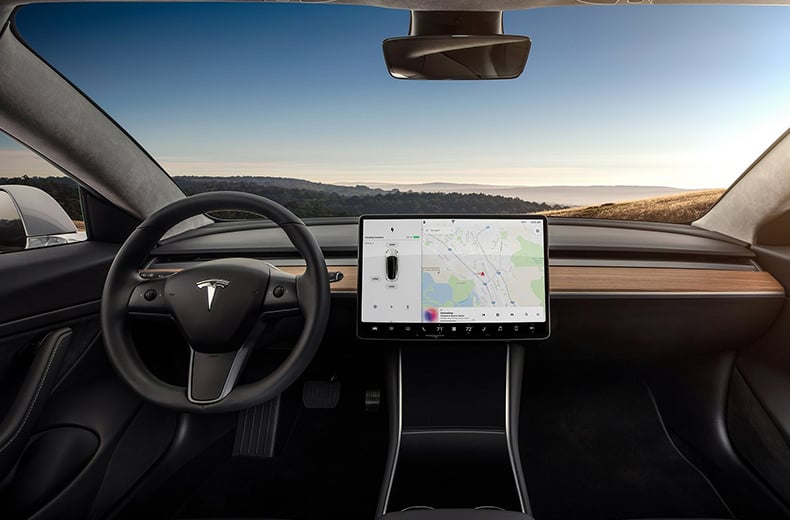
The first thing you'll notice when driving an electric car is the silence.
No gearbox means their acceleration is smooth and seamless. And because they derive maximum torque from standstill, even basic models are surprisingly quick off the mark.
Apart from a faint hum when accelerating, the only noises come from the wind and tyres.
Gears are automatic, while regenerative brakes slow the car when you lift off the accelerator to top-up the batteries.
Performance
Electric motors produce their peak pulling power from a standstill.
That means there's no need to rev the motor for swift acceleration, unlike a petrol or (to a lesser extent) diesel car.
It's also why cars like the Tesla Model S P100D are regularly breaking 0-62mph records.
Manufacturers have more flexibility when it comes to packaging electric drivetrains – mounting battery-packs close to the floor to lower the centre of gravity, for example, which means EVs often handle well too.
Electric car range
EV driving range has increased dramatically in recent years. New EVs typically have ranges of 150 to 300 miles whereas older EVs, even those just 3 or 4 years old, are more likely to have ranges of around 100 miles.
For a full overview of current electric car range and the factor which affect it, read our full guide next.
EV maintenance
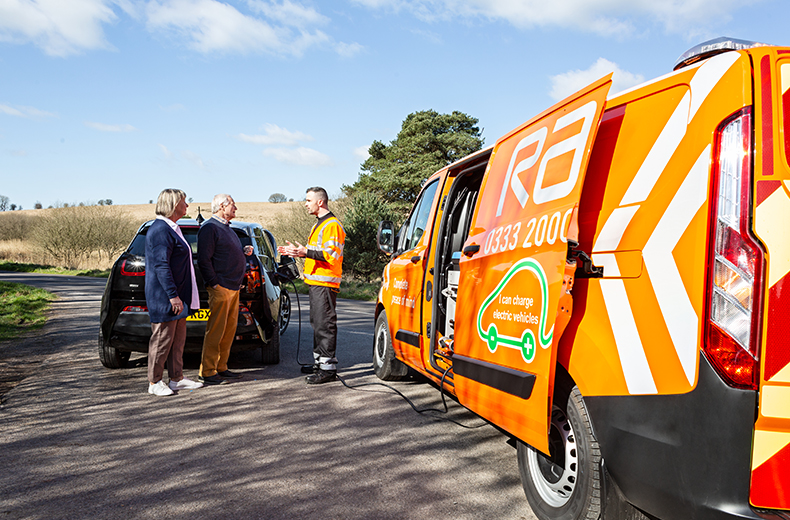
Keeping your electric car in tip-top condition will reduce the risk of unexpected bills and boost its value when the time comes to sell.
It will also ensure you stay on the right side of the law.
The RAC is the first breakdown assistance company in the UK to introduce a mobile charging unit for electric vehicle owners who have run out of charge. Find out more about RAC EV Boost.
Are electric cars less reliable than petrol or diesel cars?
Electric cars have only sold in significant numbers since around 2013, but evidence so far suggests they are very dependable.
A What Car? survey4 found faults occurred on just 5% of Nissan Leaf's, and several other popular EVs and hybrids had reliability rates in the high 90's.
For example, the Toyota Yaris was rated as 100% reliable, the Lexus RX as 99.4%, the Tesla Model S as 98.9% and the Toyota Prius as 98.4%.
All of those that did experience problems had them fixed without charge and most in under a week.
Does all that tech mean more servicing?
Electric cars still need regular servicing according to the manufacturer's schedule, although there are fewer parts to fix.
And in terms of 'more tech' a lot of these issues would likely be software related and can be fixed remotely by some EV manufacturers.
They use no oil or filters, for example, and have no conventional clutch. Until the battery needs replacement, your biggest outlay is likely to be new tyres.
How do you service an electric car?
Servicing an electric car requires specific expertise.
An EV should be serviced at a dealer which sells new EVs or a non-franchised service outlet where the technicians have been trained in high voltage system service and repair.
Electric car battery life
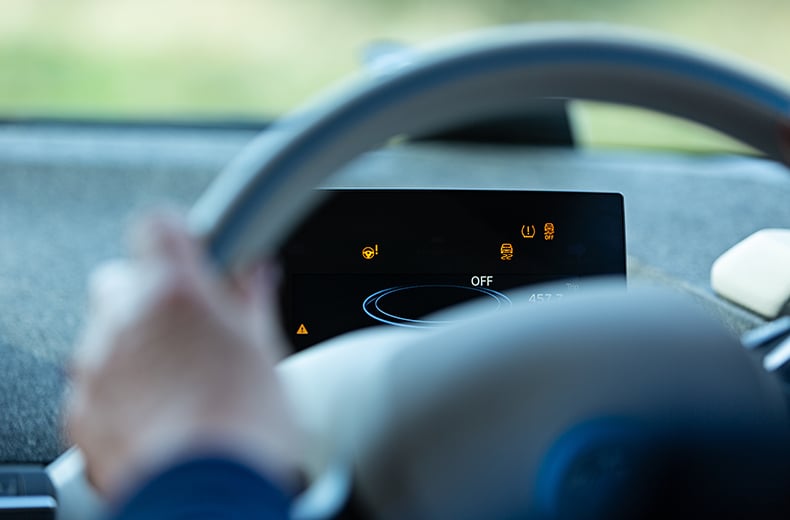
You can expect electric car batteries to last for around 10 years.
However, battery capacity will decline with age and use, potentially to around 60% of its original figure after a decade of typical use.
That means an EV with a 100-mile range would only be capable of 60 miles on a full charge.
But as electric car technology improves, so too does the battery life.
A 2017 report found that a Tesla Model S will retain between 90 and 95% capacity, even at 93,000 miles. After 150,000 miles, a Model S can expect a reduction of just 15%.
The cost of replacing batteries probably won't prove economical as the car gets older – which could mean that an EV's life-span is shorter than that of a combustion engine vehicle.
EV environmental impact
With no tailpipe emissions, electric cars certainly contribute to reducing pollution in cities.
However, non-tailpipe emissions such as brake dust and tyre particles will still be a factor, although the scale of their impact is still under investigation.
Pollution created by producing the electricity EVs run on will be the main contributor towards emissions, but the amount varies widely depending on the method of power generation.
A wind farm is much cleaner than a coal-fired power station, for example.
Read our full guide to the environmental impact of electric vehicles for more information.
Electric cars safety
There are no significant safety issues with electric cars. Indeed, the lack of flammable fuel is a tangible safety benefit.
At present, many electric cars are based on conventional petrol/diesel models, so there is no big difference in EV safety compared to internal combustion engine-powered cars.
The number of purpose-built EVs is growing, and the ability to package components more creatively (such as fitting batteries beneath the floor) potentially allows for more effective crash structures as time goes on.
Euro NCAP conducted its first crash test of a pure electric vehicle in 2011, when the Mitsubishi i-MiEV was awarded a four-star rating.
Several other popular EVs have been awarded Euro NCAP 5-star safety ratings, including the Tesla Model 3, Lexus UX, Toyota Corolla and Audi e-tron.
So... does an electric car suit you?
If you live in the Highlands of Scotland, you might believe an electric car probably isn't right for you.
On the contrary, a report by the Energy Saving Trust found that Scotland's North Coast 500 route can easily be travelled using an electric car.
There are 11 rapid charging points on the 500-mile route, which recharge batteries to 80% in 30 minutes.
"There is now a rapid charge point within many communities in the Highlands," said Rebecca Fretwell of the Energy Saving Trust.
Conversely, when the presenters of the Motoring Podcast drove an electric Hyundai Ioniq around Britain, they found a distinct lack of rapid charging points in Wales, meaning they were effectively forced to bypass the country.
Right now, EVs are best suited to city-dwellers or suburbanites who commute less than 100 miles a day because the existing charging infrastructure is far more developed in cities.
That said, it may not be easy to own an electric car if – like many city drivers – you don't have a dedicated parking space.
Without a garage, driveway or dedicated parking space, an electric vehicle will be a non-starter, as ideally, you need a driveway in order to park and charge the car overnight.
The Government offers grants for a free on-street charging point to be installed near your home, although that doesn't guarantee that other residents won't park there and plug-in.
Budget is also a consideration. If you have less than £5,000 to spend, an electric car isn't really an option.
However, the times are changing and as the market shifts towards electric, more options to suit all price ranges will surely follow.
So are you sold on EVs? Perhaps you're already the proud owner of an electric car? Let us know in the comments below.
People also ask:
-
What are the Government's targets for EVs?
The UK Government's targets (clarified in a 2018 Government publication called Road to Zero) are to end the sales of conventional petrol and diesel cars and vans by 2035, by which time all cars and vans sold will have "significant zero emission capability". This terminology would allow the sale of plug-in hybrids with a significant electric-only range. However the targets also state that by this year "most" cars and vans sold will be zero emission e.g. pure electric or perhaps hydrogen fuel cell rather than hybrid or plug-in hybrid. By 2050 the target is for "almost every car sold" to be zero emission.
-
Are EVs only suitable as second cars?
A few years ago this may have been the case but today many new EVs –even the more affordable models - have ranges in excess of 250 miles per charge so for many people EVs are become a practical option for a first or only car. Most EV owners do also own a petrol or diesel car but in many cases the thinking has been reversed so that the EV is considered to be the first car with a petrol or diesel, often an older vehicle, as a backup for the occasional long journey.
-
Do you need a special driving licence for an EV?
No, you can drive an EV on a normal driving licence for that category of vehicle.
-
If you pass your driving test in an EV, can you drive a petrol or diesel vehicle?
Since EVs don't have gears, if you pass your driving test in an EV you can drive a petrol or diesel but only an automatic.
-
Are EVs only suitable for urban driving?
No, EVs will cruise effortlessly at motorway speed and many, especially newer models, have ranges of 200 to 300 miles.
The RAC is leading the way when it comes to supporting drivers in the switch to electric vehicles.
An ever-increasing number of our patrol vans have built-in emergency mobile charging systems capable of giving an out-of-charge electric car enough power to be driven a short distance home or to a working chargepoint, while our All-Wheels-Up recovery system allows our patrols to safely rescue electric cars with no need for a flatbed.
Find out more about the RAC's electric car breakdown cover.
Learn more
Read next in Choosing an electric car
Leasing an electric car is usually a much better option than buying one. Read our guide to electric car leasing next to find out why.
Read next
NEW! Electric car leasing deals
The easy way to go electric. Get all the benefits of a brand new car, without the hassle of owning it. Find your brand new electric car today!


What Do I Need to Know About Electric Cars
Source: https://www.rac.co.uk/drive/electric-cars/choosing/buyers-guide/

0 Response to "What Do I Need to Know About Electric Cars"
Post a Comment